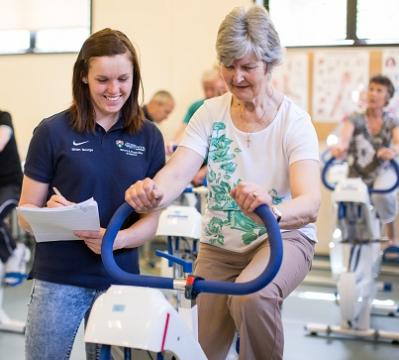Study into benefits of exercise for Parkinson’s sufferers

Participants of the high intensity exercise class with Rhian George, IBERS student.
10 August 2015
Sports and exercise scientists at Aberystwyth University’s IBERS (Institute of Biological, Environmental and Rural Sciences) have been running a high intensity exercise class for people living with Parkinson’s, in order to assess the benefits of such a programme for those living with the condition.
The pilot 12 week course has been funded by Parkinson’s UK Aberystwyth branch and is supported by Parkinson’s UK Wales.
David Langford is an exercise practitioner with the British Association of Sport and Exercise Sciences and he delivered two 90-minute sessions a week over 3 months. The course included components of high intensity fitness and strength training, balance, joint mobility, flexibility and specific patterns for coordination and walking.
Hefin Jones, Chairman of the Parkinson’s UK Aberystwyth branch and Suzanne Marchment, Area Development Manager for Parkinson’s UK Wales visited the participating group as they came to the end of their 12 week course.
Hefin Jones said: “As a local group we were delighted to fund the first course of its kind in Ceredigion. Our members are reporting back very favourably and are finding the exercise sessions of great benefit.”
Dr Joanne Wallace, Senior Lecturer in Sport and Exercise Physiology at IBERS said: “We designed this challenging programme taking into account the requirements and limitations for those with Parkinson’s. The results of our monitoring over the last 12 weeks will inform how effective this type of exercise can be in improving balance, mobility and quality of life and limiting the progression. The information we now have will also help us seek further funding for more research courses across Wales”.
Course participants include Zena Evans who said: “I have always been very fit and having been diagnosed with the condition some time ago I am still exercising regularly. This course has been beneficial for me in working with others facing similar challenges. I would be keen to play a part in running the class if any more are planned in the future. “
Gwyn Davies said: “I have enjoyed the last 12 weeks immensely and have noticed significant improvement in my movement as a result.”
Pam Williams said: “I take regular exercise but my husband’s health issues have affected that in recent years. During the course, I have seen a general improvement in my fitness and mobility and we laugh together, enjoy together and support each other.”
Barbara Locke, Director, Parkinson’s UK Wales said: “I am delighted that the generosity of the Parkinson’s UK Aberystwyth Branch has made this unique programme available to people with Parkinson’s. The benefits to participants are clear from their comments on the experience and the work with IBERS is a real flagship for our mission to help people with Parkinson’s take control of their condition. I look forward to working with Dr Wallace and her team to promote and extend this ground-breaking action research project.”
Rhian George a third year student on work experience said: “The programme is something which really interested me, and through observing and helping out each week I have gained valuable work experience as well as enhancing key skills”.
IBERS
The Institute of Biological, Environmental and Rural Sciences (IBERS) is an internationally recognised research and teaching centre providing a unique base for research in response to global challenges such as food security, bioenergy and sustainability, and the impacts of climate change. IBERS scientists conduct basic, strategic and applied research from genes and molecules to organisms and the environment.
IBERS receives strategic research funding of £10.5m from the BBSRC to support long term mission driven research, and is a member of the National Institutes of Bioscience. IBERS also benefits from financial support from the Welsh Government, DEFRA and the European Union.
Parkinson’s UK is the UK’s leading charity supporting those with the condition. Its mission is to find a cure and improve life for everyone affected by Parkinson’s through cutting edge research, information, support and campaigning. For advice, information and support, visit www.parkinsons.org.uk or call our free, confidential helpline on 0808 800 0303.
AU26315



